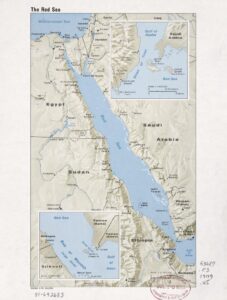President Donald Trump on Friday signed an executive order temporarily expanding the amount of beef the U.S. can import from Argentina, a move the White House says is aimed at…
First Ship Abandoned After Red Sea Attack
Bloomberg’s Omar Tamo, Mohammed Hatem, and Alex Longley reported Monday that “the crew of a commercial ship in the Red Sea abandoned the vessel following a Houthi attack — the first such evacuation since the militant group began menacing trade in the vital waterway late last year.”
“The strikes on the Rubymar, a relatively small cargo ship, were on the engine room and at the front of the vessel, a company official at GMZ Ship Management Co. in Lebanon said by email,” Tamo, Hatem and Longley reported. “There have been no reports of injuries to the crew, who are being taken to Djibouti, the official said. The UK Navy said the ship is continuing to receive military assistance.”
“‘The ship suffered catastrophic damage and came to a complete halt,’ Houthi Spokesperson Sare’e said,” according to reporting from CNBC’s Ruxandra Iordache. “‘As a result of the extensive damage the ship suffered, it is now at risk of potential sinking in the Gulf of Aden.’”
Iordache reported that “global maritime risk expert Ambrey Analytics told CNBC by email that the vessel was still afloat as of roughly 8 a.m. London time.”

Attacks Mounting
“Mounting attacks by the Houthis, which claim to support Palestinian civilians amid Israel’s retaliatory military campaign against militant group Hamas in the Gaza Strip, have crippled marine traffic through the Red Sea, which accounts for roughly 12% of global maritime transit,” Iordache reported.
But “the ship-abandonment is a milestone in the violence that has swept through the Red Sea since November, when the Iran-backed Houthis escalated their attacks with a barrage of missiles and drone strikes on the merchant fleet,” Tamo, Hatem and Longley wrote.
Effects of the Attacks
Last week, CNBC’s Lori Ann LaRocco reported that “A.P. Moller-Maersk, the second-largest global ocean carrier, is advising customers to prepare for a Red Sea crisis that could stretch well into the second half of this year.”
“‘Unfortunately, we don’t see any change in the Red Sea happening anytime soon,’ Charles van der Steene, regional president for Maersk North America, tells CNBC. ‘We’re advising them the longer transit routes could last through Q2 and potentially Q3. Customers will need to make sure they have the longer overall transit time built into their supply chain.’”
Maersk is one of a number of major shipping companies currently avoiding the Red Sea, according to Reuters’ Terje Solsvik and Vera Eckert, alongside German rival Hapag-Lloyd.
Avoiding the Red Sea means that “a significant percentage of the world’s oil and gas carriers, bulk commodity ships and container vessels are now sailing thousands of miles around Africa, adding to voyage times and boosting costs to world shipping, in order to avoid the attacks,” Tamo, Hatem and Longley reported.
Farmdoc daily‘s Sandro Steinbach, Yasin Yildirim and Xiting Zhuang wrote in late January that the Red Sea situation, along with drought in the Panama Canal region, “suggests continued challenges for U.S. agricultural exports, particularly for critical commodities such as corn and soybeans.”
“These uncertainties will require stakeholders to adapt to the increasingly uncertain global market environment,” they wrote. “This adaptation may involve diversifying logistical plans, exploring alternative shipping routes, adjusting schedules, and possibly seeking new markets to mitigate the risks of reduced canal capacity and disruptions in key shipping lanes.”





